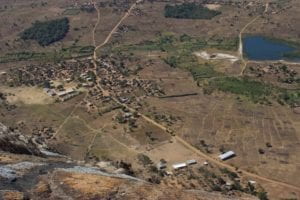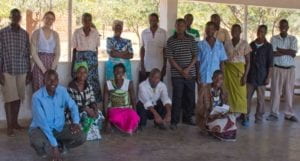Bailey Theado
Goods for good
Lilongwe, Malawi
Preparing for my interviews at Bright Vision during the spring semester was intimidating. Bright Vision is a community-based organization (CBO) that supports children in the Ngala community with various programs, from offering a feeding program during the “hunger season” to engaging with rights advocacy to providing preschool. I was worried about the language barrier, if anyone would be willing to speak to me, if my questions would get too political, and if my presence would be an inconvenience to their work.
When I arrived to Malawi, I had to first present my research proposal to all of the CBO volunteers and leaders at Bright Vision in Ngala to gauge their interest in speaking with me. The day I went to present my research I had to meet with the Makanga Group Village Headman first, who oversees seven other Group Village Headmen, for permission to interview members of his community. But after a very warm welcome I was able to interview him as well, and at the end when we were just chatting about ourselves, he even offered to host my wedding when I chose to get married! Who knows, maybe I’ll take him up on that and get married in Ngala!

Feeling positive about my meeting with the Makanga, I was ready to speak with all of the CBO volunteers and leaders. About an hour later, we all met in the building where the CBO conducts their feeding program; they were accompanied by about twenty of the orphaned children Bright Vision supports through its child-headed household program. The oldest child could not have been over sixteen years old and the youngest around four. I couldn’t interview them because only those over 18 can legally consent to the interviews.
Initially, I felt very uncomfortable when I, along with my translator, were put at the very front of the room behind a huge desk for the introduction. We decided to move closer and sit in the smaller chairs in front of the desk, as all of the volunteers were sitting on the ground. I noticed that women and children were seated on the ground to the left of me and the men were concentrated on the right, most sitting in chairs.
First, the volunteers and leaders went around and introduced themselves in Chichewa, standing up each time. I then introduced myself and let them know that most importantly, I was invested in understanding how they understood their work and the rights of the child. Thinking about my previous ethnography courses and a conversation I had with the goods for good program director about the importance of transparency, I was sensitive to asking the group if they had questions for me and making it clear that they should not feel pressured to participate.
However, during the meeting, I realized that my role with the CBO might be misconstrued as that of a teacher or a donor versus a researcher. This also happened a few weeks ago at the large group interview I had with all of the CBO leaders in the Traditional Authority, when we were discussing the challenges they are facing. The interviewees said a few times that it would be great if I could find them donors when I returned to the US.
At the end of the discussion, a man asked me how the report I would write would help Bright Vision and if it could be brought to the government to encourage support. I got both really excited and intimidated; I had a long way to go to understanding how that could happen, but I wanted to find out. As I drove back to Lilongwe, I felt buzzed and excited that so many volunteers were ready to interview, after scheduling participants for the next month. My research had suddenly become very real, not just a bundle of ideas I had in New York. I was now accountable for producing something for the community.

I’ve learned that the most important thing in doing research here in Malawi is to be flexible and to not be shy to reach out to academics and practitioners. Here, 10:00 am means maybe 10:30! My research has been disrupted by large funerals, illnesses or a lack of transport but it’s just taken a few more days of planning to get things back on track. On some days I have had six people show up for interviews, on other days two. My largest group of interview was last week, where I interviewed ten people from the surrounding community who interacted with the CBO but did not volunteer. I’ve also learned to not be shy to reach out to professionals and make connections with the help of goods for good. The librarian at the Malawian Human Rights Commission has been incredibly helpful in addition to my contacts engaged in child protection at the Paralegal Services Institute.
I have been able to do some interviews in English, but I find myself a bit frustrated at not knowing what is lost in translation between Chichewa and English. Some interviewees will face me and answer questions, whereas others will speak directly to my translator, Watanja, who has been very helpful in the translation.
In order to do this research to its fullest, I wish I could interview all of the CBOs in the Traditional Authority because in many ways Bright Vision is quite unique. For starters, they are able to provide a few allowances to their volunteers. Additionally, they have a main center as well as branches in the surrounding area that provide programs.
Now, after almost 40 interviews with all CBO staff, some people from the community, and a large interview with CBO leaders from the whole Traditional Authority of Chadza, I wish I could go back in time and tell myself that everything would work out and that I would wish I just had more time.